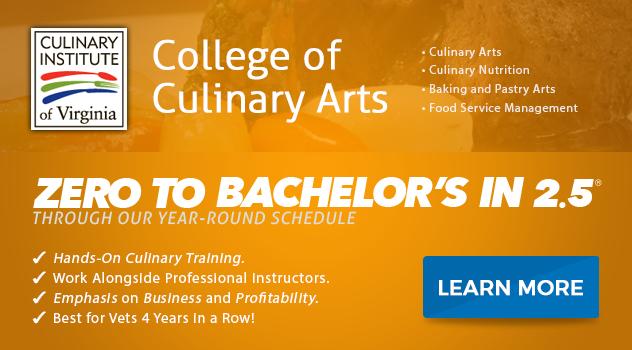
Jobs to Explore with a Culinary Nutrition Degree
Traditionally, good food and food that is good for you don’t necessarily go together.
People who want to be healthy have grudgingly forced down menu choices that rarely taste good, from soy to sprouts. Even though they are better off, nutrition-wise, it is still tempting to stray when their dining companions bite into juicy burgers. And don’t forget the inevitable ribbing about "tree bark" or "rabbit food."
These days, however, there are enough healthy options and recipes that you can actually put something together that looks good, tastes good, and most importantly, has health benefits. Some creative recipes and appetizing substitutes have also helped diminish the peer pressure – you’re now more likely to hear peers say, “What is that? That looks great!”
Restaurants have begun offering healthier alternatives, and the President’s Council on Fitness, Sports & Nutrition continues to promote good nutrition as part of a healthier lifestyle. Besides offering tasty food choices, these efforts can also teach habits to reduce obesity which is becoming a national health epidemic, according to the Centers for Disease Control.
If you’re interested in being part of this national initiative, consider studying culinary arts and applied nutrition. You’ll learn food science but with a practical purpose – how to help establishments from hotels to retirement communities offer better fare for their guests.
Here are some job opportunities in the culinary nutrition field:
- Dietetic Technicians help create menus and prepare meals for people with different food needs, such as at schools, nursing homes, hospitals, day cares, clinics or prisons.
Their duties include learning about special food needs and their relationship to health, everything from allergies to other dietary restrictions. The position also requires knowledge of sanitation and cleanliness.
Though the educational path for actual dietitians may require additional education, a technician position may provide some valuable experience for someone with a culinary arts background.
- Food Service Manager. Additional training in nutrition and special dietary needs can make a candidate more valuable than someone with a purely food service background. This position is responsible for the daily operations of a restaurant or a similar establishment, including making sure customers have a quality experience in terms of food and atmosphere, and that the back-end staff performs well. It also can include detail-oriented work like ordering supplies, planning menus, and staying within budget.
- Community Health Worker. Nutrition and dietary training can be handy for teaching people how to eat better and promote general wellness. Schools can be a primary audience, especially since this knowledge fits well with general initiatives to boost health and reduce obesity. A counterpart position, Health Educator, generally requires at least a bachelor’s degree or higher, but the Community Health position requires less. A high school diploma is the minimum, but the Bureau of Labor Statistics says some positions could require a certificate, an associate’s degree, or extra life experience in a related area. Some states may require or recommend additional certification.
- Food Safety Specialist. Instead of preparing food, you could help make sure other food service establishments, food suppliers or food processors are storing and preparing food well. A background in Culinary Arts and Applied Nutrition can be an asset in advising employers how they can improve their sanitation procedures. The Food Safety Specialist can focus on different areas of food production or types of industry. Though inspectors are the most visible area of this position, Safety Specialists work with food processors, inspect equipment, and even examine seeds. Working in this field can offer the experience to apply for a Food Inspector position, usually with a government agency. Salary range varies, since the positions can fall under several BLS categories, depending on the position and required skills.
#LatePost ratatouille& pot roast & veal blanquette @ Culinary Institute of Virginia - ECPI University… http://t.co/9ALUpXXDmH
— RAMBLER (@beeleeve_jenks) April 30, 2013
Earning a Degree in Culinary Nutrition
Overall, an Associate of Applied Science degree in Culinary Arts and Applied Nutrition can open many doors for people interested in helping others eat well and eat healthy. To learn more about this or other useful degree programs, please contact ECPI University’s College of Culinary Arts, Culinary Institute of Virginia, today. It could be the Best Decision You Ever Make!
DISCLAIMER – ECPI University makes no claim, warranty or guarantee as to actual employability or earning potential to current, past or future students or graduates of any educational program we offer. The ECPI University website is published for informational purposes only. Every effort is made to ensure the accuracy of information contained on the ECPI.edu domain; however, no warranty of accuracy is made. No contractual rights, either expressed or implied, are created by its content.
For more information about ECPI University or any of our programs click here: http://www.ecpi.edu/ or http://ow.ly/Ca1ya.



